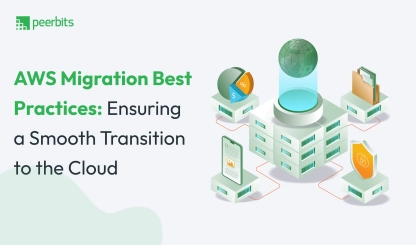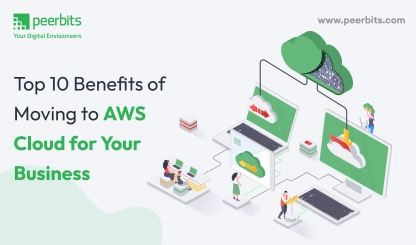Cloud adoption is one of the peak practices amongst all kinds of businesses being built nowadays. Based on O’Reilly’s report, around 90% of organizations use the cloud for their infrastructure. Still many face numerous challenges even after cloud adoption.
A StormForge report stated that 75% of organizations saw an increase in cloud waste. Many cooked up a correlation that as the cloud spending increased, so did their cloud waste. But there are many other reasons behind it. One such reason is management of cloud services.
If you’re wondering that your work stops, once you successfully adopt cloud solutions for your business, then you are wrong! Regular check ups & management of resources is also an important part of the job that you can’t miss. Now, who’s gonna do that for your business? Yes you guessed it right- managed cloud services.
In this blog we will explore all about managed cloud services, its definition, types, benefits, how to choose the right cloud managed service provider for your business and much more. Let’s begin with the basics then.
What are managed cloud services?
Managed cloud services are such helps, that offer partial or complete management of a client’s cloud resources or infrastructure. The responsibilities included in these services are migration, configuration, optimization, security, and maintenance. It aims is to maximize benefits of cloud services while minimizing internal time and costs.
Managed cloud services can be easily opted for public, private, or hybrid clouds at any point in the cloud adoption lifecycle. Usually, organizations consult for cloud services before migration, to identify which cloud resource best suits their needs.
What is a Managed Cloud Service Provider (MCSP)?
An MCSP is a vendor that provides all the above described cloud management services. These managed cloud providers are sometimes directly connected to the cloud resources of the project or sometimes liaised as a third-party operator like us.
Managed cloud providers typically have pre-built subscription offers for a wide range of services. Many small scale businesses utilize MCSPs as a replacement for in-house cloud IT teams or a supplement team to in-house cloud.
Managed cloud service providers: Key services
Though there are a series of responsibilities included in MCSP’s checklist but some of the significant services provided by them to optimize cloud operations and enhance business performance are as follows:
-
Cloud monitoring: Continuous monitoring of cloud resources for performance, security threats, and potential issues.
-
Patch management: Giving a constant check for timely updates and security patches that are applied to cloud infrastructure and applications.
-
Network management: For security, performance, and efficiency of the network, optimizing and managing cloud network configurations.
Types of cloud managed services
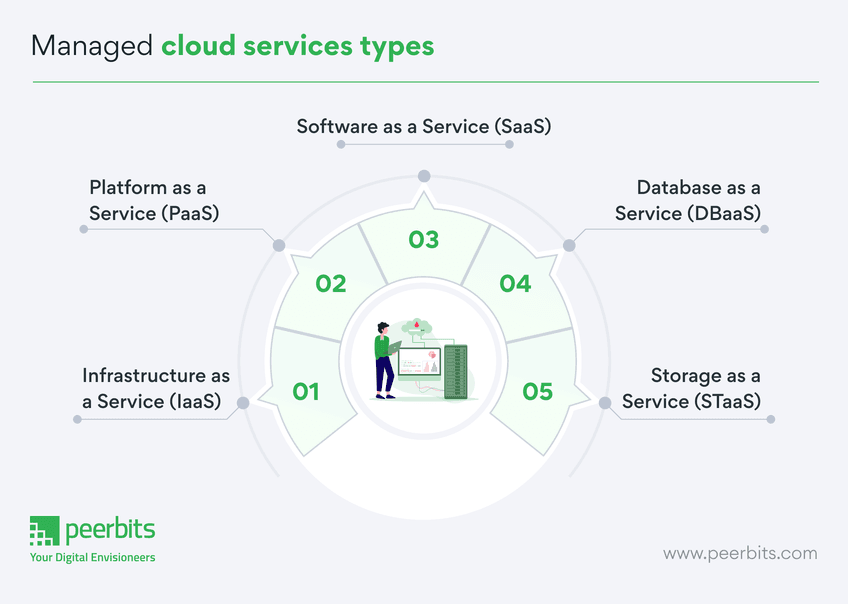
Cloud managed services uphold a variety of offerings designed to optimize cloud utilization and reduce operational burdens. Here's a list of important managed cloud service categories:
Infrastructure as a Service (IaaS)
It involves:
-
Providing on-demand computing resources, including servers, storage, and networking.
-
Granular control over infrastructure components.
-
Examples: Microsoft Azure Virtual Machines, Amazon EC2, Google Compute Engine
Platform as a Service (PaaS)
It is responsible for:
-
Delivering a cloud-based environment for developing, testing, and deploying applications.
-
Offering pre-built components like databases, middleware, and development tools.
-
Examples: Microsoft Azure App Service, AWS Elastic Beanstalk, Google App Engine
Software as a Service (SaaS)
It offers:
-
Applications onto the cloud, eliminating the need for their local installation.
-
Focuses on end-user functionality rather than infrastructure management.
-
Examples: Salesforce, Microsoft Office 365, Dropbox
Database as a Service (DBaaS)
It provides:
-
Database creation management, configuration, and maintenance everything on cloud.
-
Scalability, high availability, and automated backups
-
Examples: Amazon RDS, Google Cloud SQL
Storage as a Service (STaaS)
It delivers:
-
Data storage and management capabilities in the cloud.
-
Scalability, durability, and data protection features.
-
Examples: Amazon S3, Google Cloud Storage etc.
Additional managed services of cloud:
Apart from the conventional managed cloud services, here are a few more services you should know:
-
Security as a Service (SecaaS): It provides security solutions like threat detection, intrusion prevention, and data encryption in its cloud offerings.
-
Disaster Recovery as a Service (DRaaS): As the name says it offers backup and recovery solutions for business continuity in times of necessity or disaster.
-
DevOps as a Service (DaaS): This offering includes managed DevOps tools and services for application development and deployment.
Now you’ve gained quite an understanding about the managed cloud services & their types. Though how do all these components come together for ultimate management of the cloud? Let’s have a look at that.
Also read: Everything you need to know about cloud consulting for your business
How does managed cloud services work?
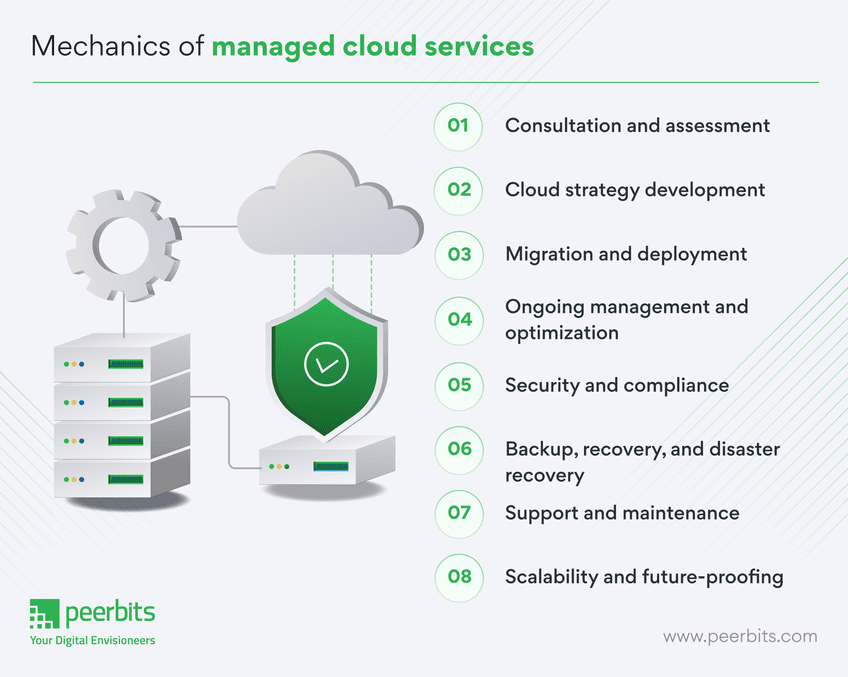
Managed cloud services work by providing businesses with comprehensive cloud management and support. Here's how managed cloud services typically function:
1. Consultation and assessment:
Like any solid strategy planning, this service begins with research. The process usually begins with a cloud consultation where the service provider assesses the business's current IT infrastructure, cloud readiness, and specific needs. Further, the provider helps businesses to understand its goals, challenges, and requirements.
2. Cloud strategy development:
Based on the assessment, the managed service provider (MSP) builds a cloud strategy customized to the business's needs. Here the decision for choosing the cloud platforms out of AWS, Azure, Google Cloud etc. also gets taken by the cloud experts.
3. Migration and deployment:
The managed service provider manages the migration of existing applications, data, and workloads to the cloud. They guarantee a smooth transition with minimal disruption to business operations.
4. Ongoing management and optimization:
Once the cloud environment is set up, the MSP provides continuous management, monitoring, and optimization. This includes managing cloud resources, improving performance, implementing security measures, and optimizing costs by rightsizing resources.
5. Security and compliance:
The MSP ensures that the cloud environment complies with industry regulations and standards, such as GDPR or HIPAA. They implement security measures like encryption, identity management, and regular security audits to protect data and applications from any security threats.
6. Backup, recovery, and disaster recovery:
Managed cloud services also include setting up and managing backup and disaster recovery solutions. This ensures that business-critical data is regularly backed up and can be quickly restored in case of an incident.
7. Support and maintenance:
The MSP provides 24/7 support and maintenance services for your cloud infrastructure too. This includes monitoring the cloud environment for any issues, providing troubleshooting, and making sure that the cloud services are always up to date with the latest patches and updates.
8. Scalability and future-proofing:
Managed cloud services bring in scalability to the businesses. It means that the infrastructure can grow with the business, making it easier to adopt new technologies or expand services when required.
By outsourcing cloud management to an MSP, businesses can focus on their core activities while making sure that their cloud infrastructure is optimized, secure, and capable of supporting their growth and innovation.
Now, you know how managed cloud services function for your business needs. Let’s see some substantial benefits of cloud managed services that can supercharge your system again.
How businesses benefit from managed cloud services?
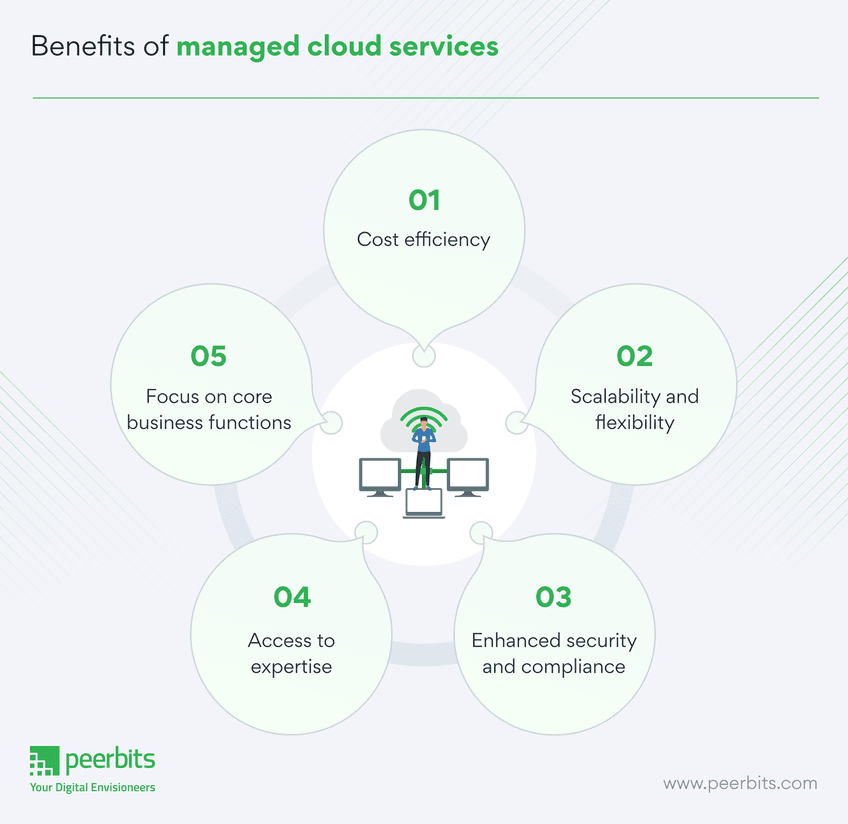
Here are five key benefits, that businesses can gain from managed cloud services:
-
Cost efficiency: Managed cloud services help businesses optimize their cloud spending by confirming resources are right-sized and utilized effectively. They also cut down on unnecessary expenses and allows companies to take advantage of a pay-as-you-go model, avoiding high upfront costs.
-
Scalability and flexibility: Resources can be scaled up or down based on the changes in peak demands. It allows businesses to adapt quickly to market changes, seasonal spikes, or growth opportunities without worrying about infrastructure limitations.
-
Enhanced security and compliance: Managed cloud service providers implement reliable security measures and help ensure compliance with industry regulations. It offers regular updates, monitoring, and access controls, reducing the risk of data breaches and ensuring adherence to legal standards.
-
Access to expertise: With the managed cloud services, businesses gain access to a team of cloud experts who can provide guidance, optimize performance, and handle complex cloud environments for you. This expertise helps companies make informed decisions and improve their overall cloud strategy.
-
Focus on core business functions: Managed cloud services allow businesses to offload the management of their cloud infrastructure to experts. This in turn enhances overall business agility.
These benefits collectively help businesses to not only reduce operational costs but also enhance performance, security, and agility in their cloud environments.
Also read: All you need to know about cloud-native development for your business
Which business should opt for managed cloud services?
Many might preach that the cloud is better for everyone. But you should check your business requirements for managed cloud services before dwelling deeper into it. Here’s what you shouldn’t miss:
Small and medium-sized businesses (SMBs): SMBs often lack the internal IT resources to manage their cloud infrastructure effectively. That’s where managed cloud services can help with their reach to expertise and resources SMBs wouldn’t have before.
Startups: Startups can utilize cloud managed services to scale their cloud infrastructure rapidly as their business grows. This will not need significant upfront investment too.
Enterprises with complex IT environments: Large enterprises with intricate cloud deployments get the most benefit from the expertise of cloud managed service providers. As they help in optimizing performance, security, and compliance.
If you’ve figured out whether your company needs managed cloud services or not. Then make sure you choose a reliable cloud managed service provider for a smoother transition.
Use cases of managed cloud services for businesses
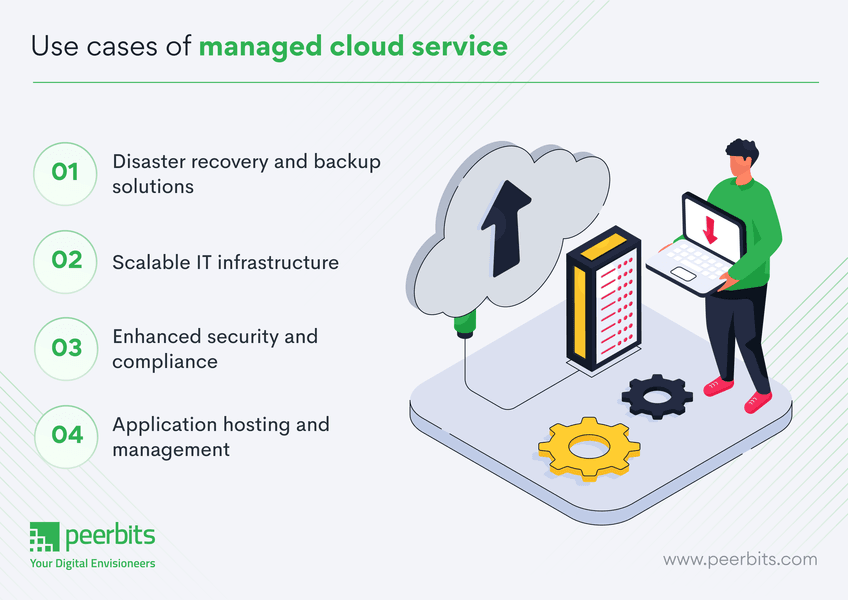
Here are four key use cases of managed cloud services for businesses:
-
Disaster recovery and backup solutions: Managed cloud services gives businesses an awesome disaster recovery and backup solution. In fact, companies can automatically back up critical data to the cloud and restore it quickly in the event of a system failure or cyberattack. It gives them a minimal downtime and data loss, helping in sustaining continuity and protection against various data breaches.
-
Scalable IT infrastructure: Managed cloud services help businesses in scaling their IT infrastructure easily. Whether a company is growing rapidly or facing fluctuating demands, it can adjust its cloud resources, such as storage, computing power, and network capacity, in real-time.
-
Enhanced security and compliance: Many businesses rely on managed cloud services to enhance their security posture and ensure compliance with industry regulations. Managed cloud service providers deliver advanced security features, including encryption, firewalls, and intrusion detection systems. Additionally, firms can easily follow regulatory requirements like GDPR, HIPAA, or PCI DSS by providing compliant cloud environments and regular security audits.
-
Application hosting and management: Managed cloud services are often used for hosting and managing business applications. This includes everything from e-commerce platforms and customer relationship management (CRM) systems to enterprise resource planning (ERP) software. All the maintenance, updates, and performance optimization, can be easily taken over by the cloud. It allows businesses to focus on their core activities without worrying about the technical aspects of application management.
These use cases demonstrate how managed cloud services can enhance operational efficiency, security, and scalability, making them a valuable asset for businesses of all sizes.
How to choose the right cloud managed service provider?
When choosing the right cloud managed service provider (MSP), consider the following five key factors:
-
Expertise and experience: Look for a provider with a proven track record in managing cloud environments similar to yours. Evaluate their certifications, case studies, and client testimonials to ensure they have the necessary expertise to handle your specific cloud requirements.
-
Service offerings and flexibility: Make sure that MSP offers a wide range of services that can cater to your current and future needs. A good provider should offer flexibility in their service plans, allowing you to scale resources, choose from different cloud models (IaaS, PaaS, SaaS), and customize solutions as your business evolves.
-
Security and compliance: Security is critical when managing cloud environments. Verify that the MSP has proper security measures in place, including encryption, access controls, and regular security audits. Also make sure they comply with industry standards and regulations relevant to your business, such as GDPR, HIPAA, or PCI-DSS.
-
Support and SLA (Service Level Agreement): Assess provider’s support offerings, including the availability of 24/7 support, response times, and the quality of their technical support team. The SLA outlines the levels of service you can expect, including uptime guarantees, issue resolution times, and penalties for non-compliance.
-
Cost transparency and management: Consider the cost structure of the MSP, ensuring that it aligns with your budget and provides value for money. Transparent pricing with no hidden fees should also be offered. They should also brief you about the tools for monitoring and managing cloud costs effectively.
By carefully considering these factors, you can select a reliable cloud managed service provider that aligns with your business goals, giving you a successful and secure cloud journey ahead.
Conclusion
In summary, managed cloud services offer businesses a reliable & detailed solution for optimizing their IT infrastructure, driving innovation, and ensuring scalability. By understanding the benefits, exploring various use cases, and carefully selecting the right provider, companies can utilize these cloud services to streamline operations, reduce costs, and stay competitive. Whether it’s about improving security, managing compliance, or ensuring seamless cloud migration, the right managed cloud partner plays can win all!
At Peerbits, we provide custom-made cloud services that cover every aspect of your cloud journey. From strategic planning and migration to ongoing optimization and support, we ensure your business harnesses the full potential of the cloud. Explore our cloud services today to take your business to the next level.


